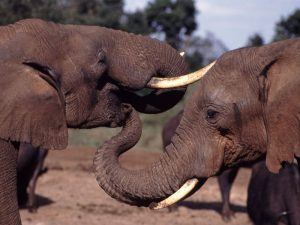Katherine J. Wu in Smithsonian:
 Elephants are one of nature’s biggest improbabilities—literally. Their colossal bodies somehow manage to defy the odds: Despite the fact that their cells outnumber humans’ by a factor of about 100, elephant cancer mortality is somehow only a third of ours. This baffling inconsistency has plagued scientists for decades. It even has a name: Peto’s paradox, a nod to the epidemiologist who first noted the phenomenon in the 1970s, studying humans and mice. But new research published today in Cell Reports shows that, to keep cancer at bay, elephants have a devious trick up their trunks—a molecular self-destruct button, reanimated from beyond the grave. At first glance, being multicellular seems like a pretty great gig. It allows the existence of stronger, more complex organisms that can climb the food chain. But quantity is a double-edged sword. Imagine a deck of cards. The fifty-two hearts, spades, clubs and diamonds are perfectly healthy cells, but the two jokers—those are cancer. Building a body is like picking cards one by one from this unavoidably stacked deck. The bigger the body, the more cards must be drawn—and the lower the odds of staying safe. Each additional card is another potential point of corruption.
Elephants are one of nature’s biggest improbabilities—literally. Their colossal bodies somehow manage to defy the odds: Despite the fact that their cells outnumber humans’ by a factor of about 100, elephant cancer mortality is somehow only a third of ours. This baffling inconsistency has plagued scientists for decades. It even has a name: Peto’s paradox, a nod to the epidemiologist who first noted the phenomenon in the 1970s, studying humans and mice. But new research published today in Cell Reports shows that, to keep cancer at bay, elephants have a devious trick up their trunks—a molecular self-destruct button, reanimated from beyond the grave. At first glance, being multicellular seems like a pretty great gig. It allows the existence of stronger, more complex organisms that can climb the food chain. But quantity is a double-edged sword. Imagine a deck of cards. The fifty-two hearts, spades, clubs and diamonds are perfectly healthy cells, but the two jokers—those are cancer. Building a body is like picking cards one by one from this unavoidably stacked deck. The bigger the body, the more cards must be drawn—and the lower the odds of staying safe. Each additional card is another potential point of corruption.
All cancer needs is a single cell—one devious joker—to mutate and run amok, eventually creating an insatiable army that hoards the body’s natural resources and crowds out vital organs. Science has often confirmed this unsettling pattern: When it comes to dogs, bulkier breeds have higher rates of tumors, while punier pups are spared. In humans, simply being a few inches taller ups your risk of cancer. Behemoths like elephants and whales, however, turn their often-considerable noses up at this trend. Somehow, these gargantuan species either have fewer jokers in their deck—or have devised some way of screening them out of the final product. Peto’s paradox has weighed on the mind of Vincent Lynch, a professor of evolutionary biology at the University of Chicago, for years. So Lynch and his research group were thrilled to unveil a piece of the puzzle in 2015, when they and others reported that elephants carry extra copies of a cancer-fighting gene called TP53.
More here.
